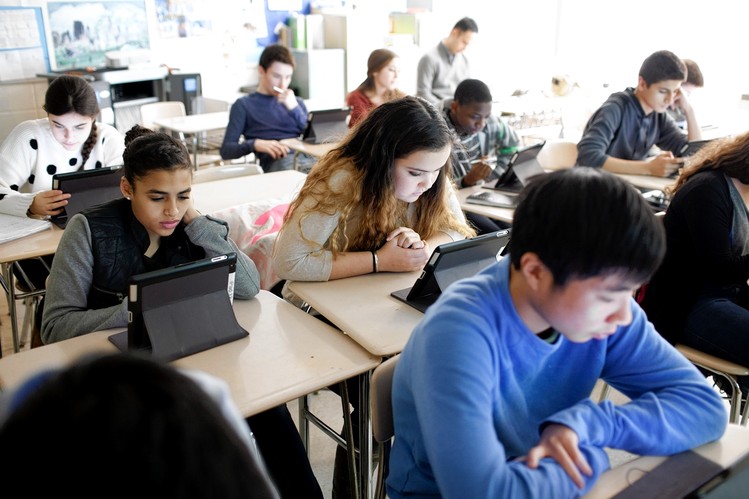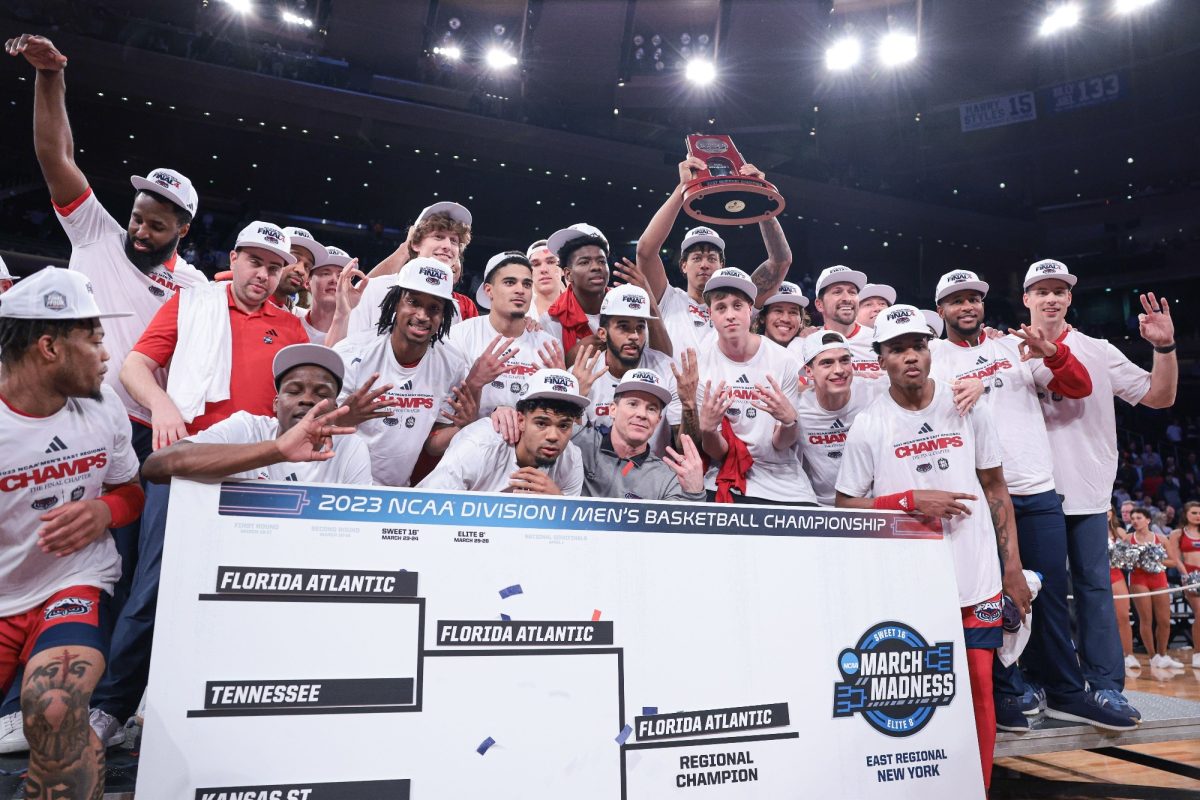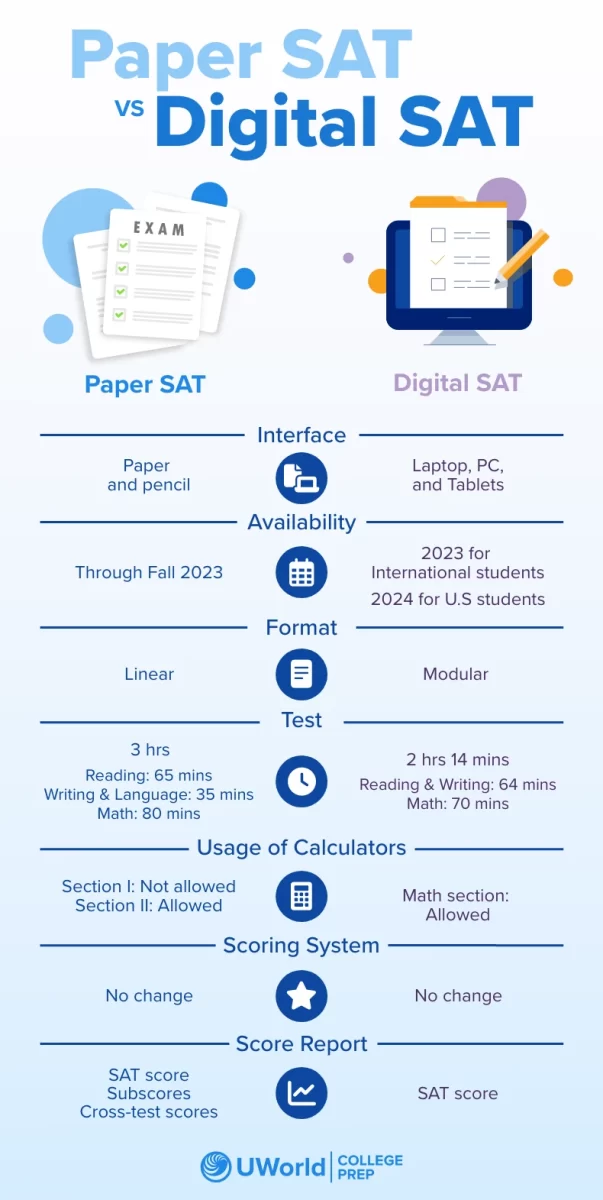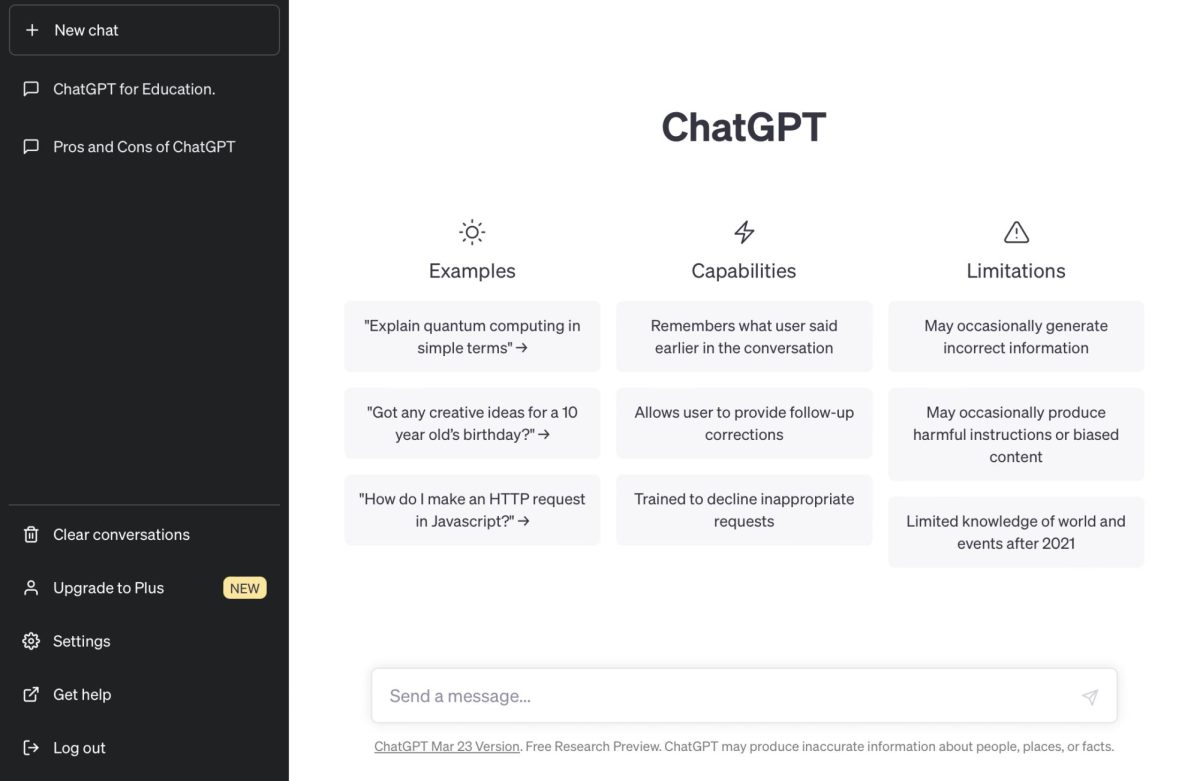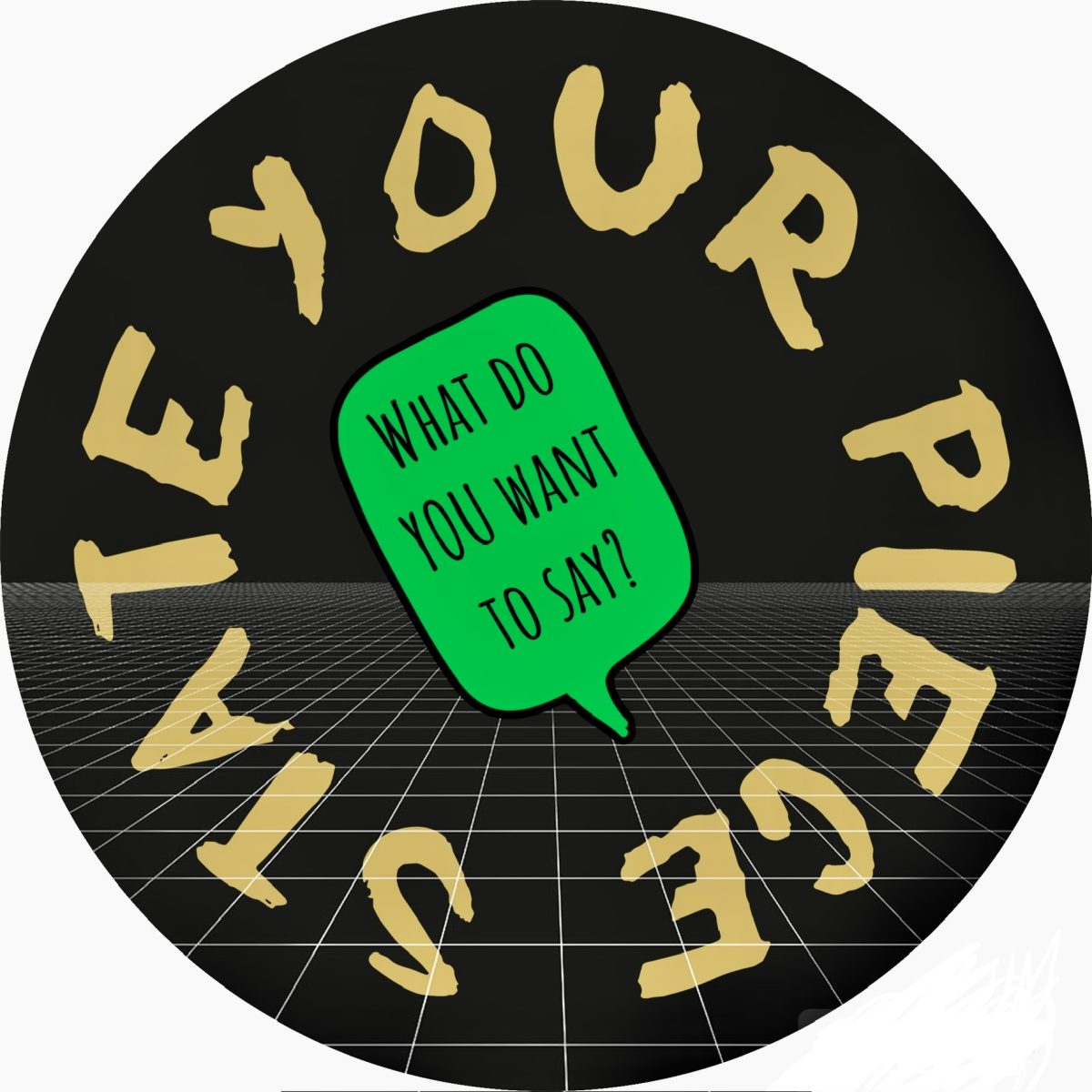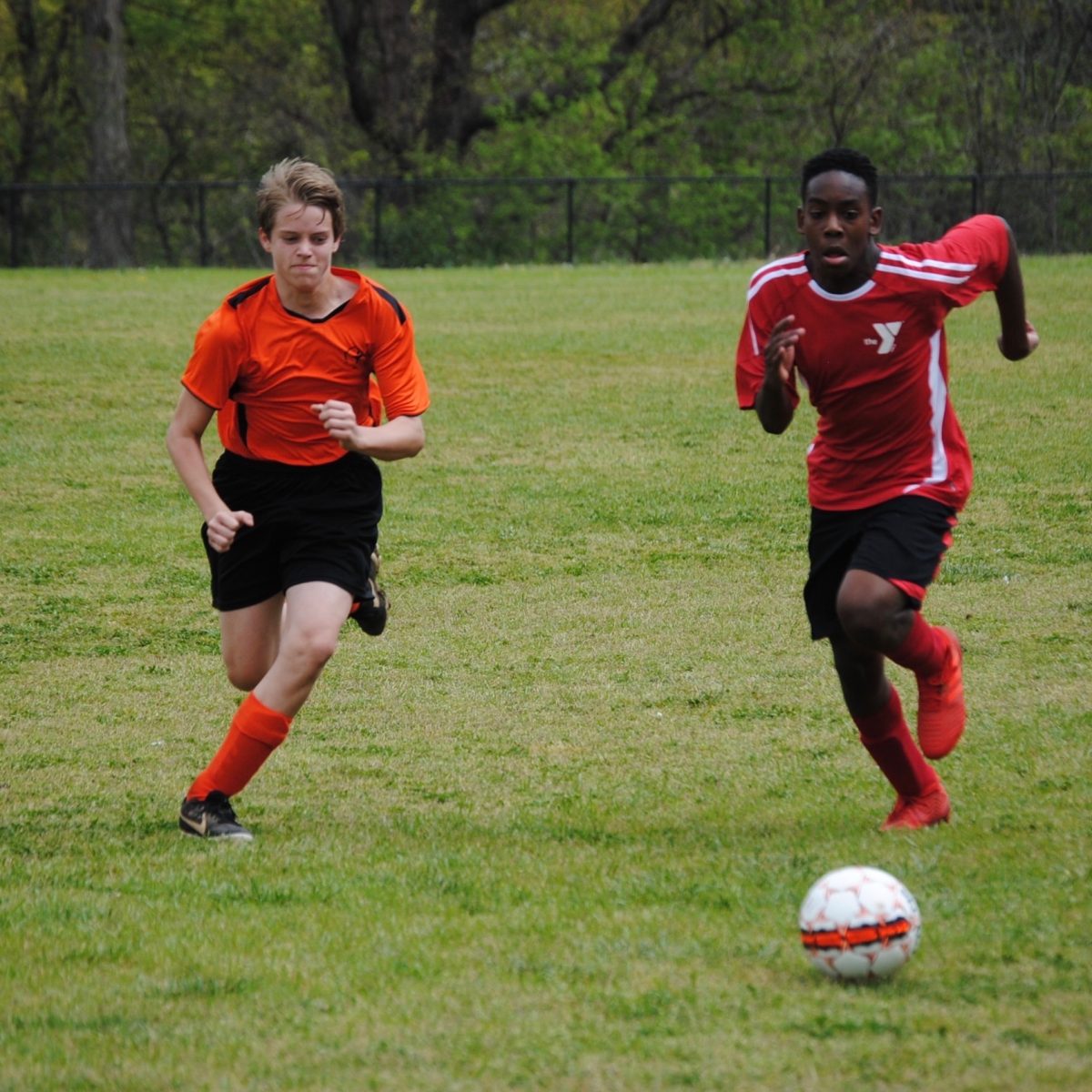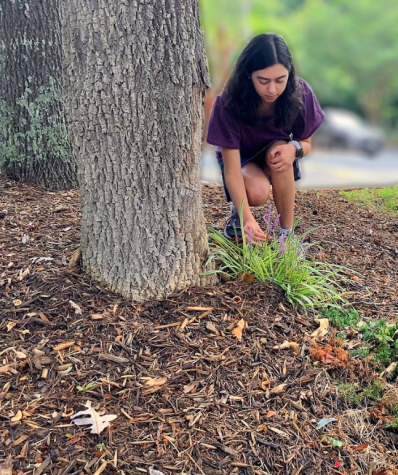ChatGPT has already been altering the world of education. Many teachers have tried it for fun in various ways. Lori Davis, Director of Student Publications, said, “I used it to see if it could write a credible creative writing assignment (since I advise the literary and arts magazine); I also wanted to see if the program could intuit a specific lesson plan for my class. I was shocked at the quality of the flash fiction piece—the program followed each of the points I included, and it was incredibly clever and had a great twist at the end. There was a natural “voice” that was, in all honesty, terrifying. I wasn’t prepared for the sophistication inherent in the response. I also asked it to write a poem—again, I gave it prescribed criteria, and it pushed out a poem I would have been happy to put in our book. Each of these pieces were produced in less than 60 seconds. I think the lesson plan had some good potential, and while I didn’t end up using it, the breakdown of scope and sequence was accurate and helpful. I could see the program being a good way to jumpstart someone if they are feeling a bit stale or burned out and need a little help getting organized or getting inspired.” Whether students are aware or not, ChatGPT has been sneaking its way into class. Mary Fabian, US Science, said, “I have used it to create physics problems for assessments. I was pleasantly surprised at the quality of problems it produced, with some direction from me. I also liked that it included a full solution along with the problem statement.” In certain elective classes, ChatGPT plays a major role in everyday assignments. Adam Durrett, Innovation and Design, said, “I’ve used it for programming, creating rubrics, lessons, assignments, and using it like google to ask questions. It’s a great study tool! I allow my students to use it in class to help them program—as long as they are not having it code for them.” Bilal Butt, Director of Speech and Debate, said, “I use it for examples of different arguments or concepts that we discuss in class. It is used for breaking down different topics and a starting place on our research. Chat GPT can make tables and organize information in ways that are more sophisticated than just Google results.” Other teachers are forming plans for improving classes in the future. Hugo Caraballo, World Languages, said, “The chatbot could be programmed to ask and answer questions commonly asked during a conversation with a foreign exchange student, such as questions about their home country, culture, language, and interests. This can help my students prepare for a meeting with the exchange student and feel more comfortable interacting with them. Another way I am exploring using ChatGPT is to create sample conversations that my students can study and use as a model for their conversations. These sample conversations can help my students understand what to expect and how to converse with someone from a different culture. I have also explored using ChatGPT to provide language practice for students. For example, you could program ChatGPT to respond to questions or prompts in Spanish, and my students could practice their language skills by responding in kind. This can help my students build confidence in their language abilities and prepare them to communicate more effectively. ChatGPT can provide personalized learning experiences for students by tailoring content and assessments to their needs and abilities. For example, ChatGPT could be used to generate quizzes or practice exercises that adapt to the student’s level of knowledge and provide feedback based on their responses.”
ChatGPT could also affect education in a negative manner. Whitney Duquette, US History, said, “I’m nervous that it could take away the importance of critical thinking and the writing process in certain disciplines like History.” ChatGPT can give wrong information that results in less educated students. Jessie Sellner, Upper School Science, said, “Since the explanations produced sound “like science,” I think it makes it hard for students to assess the validity of what they’re reading. I asked one AP Chemistry question and got some really helpful, good explanations that I thought could be really helpful to students who might be looking for another resource. On another topic, however, it gave a similar level of response, but the facts were backwards. Someone learning the material for the first time wouldn’t be able to recognize the errors.” Rebecca Courter, US Math, said, “I asked it to write a 45 minute PreCalculus test about Polar Coordinates and also to give a worked out key just to see what it could do. It was not a good test. It gave me a 10 problem test, but one of the problems required Calculus to solve. Then it gave me a completely different problem (not an alternate solution) and the solution to that alternate problem was completely wrong (almost nonsensical).” With the arrival of ChatGPT comes more opportunities for cheating in schools. Spencer Dowd, US English, said, “I worry that a lot of these generative AIs are being released too quickly without a full assessment of the ethical implications and dangers involved. I was surprised that it was put so quickly into the hands of the masses without much testing, regulation, or even explanation. I believe it will be a tool for lazy people to further distance themselves from the hard work of thinking and writing, which will be detrimental to those individuals and eventually society. I have already dealt with a student using it (honor code violation), so I also worry about curtailing AI-assisted cheating.” Because the writing sounds so similar to that of a human, determining the difference between a piece produced by a human or the AI can be difficult. Work done by an AI could be used to complete assignments in class, homework problems, the college essay, the SAT, and the Bar Exam to become a lawyer, revealed by CEO of OpenAI Sam Altman in an interview with ABC. Unfortunately, there is no reliable way to scan for AI-created content. Open AI created a classifier tool that flags 26% of AI written text and gives 9% false positives according to ZDNET. Other AI detectors exist, but they are extremely inaccurate. Expressing her concern, Allie Haynie ‘26 said, “I worry that people or classmates could use this platform for a paper and might not be caught. It would be hard because many people would work very hard to get a good paper and all they would have to do is type a few key words in and get a fantastic essay.” Logan Yee ‘25 thought about how the work ethic of students could decrease. “People will become lazy because it is able to do their work. Although tools have been invented like this before, like the calculator, chat gpt has unlimited capabilities.”
Teachers have already been rethinking what ChatGPT means for education and how their classrooms may have to change as a result of its introduction. Alan Becker, EdTech, said, “Teachers will need to define when AI use is appropriate and when it is not, and this will vary by assignment and by discipline. Students will need to understand and honor that line of appropriateness or they risk short-circuiting the basic educational function of going to school.” In order to combat cheating, teachers will need to utilize tools as they become available. Richard Harris, US English, said, “Here’s the good news from Turnitin.com: ‘Turnitin has successfully developed an AI writing detector that, in its lab, identifies 97 percent of ChatGPT and GPT3 authored writing, with a very low less than 1/100 false positive rate. The company plans to add this functionality to its core writing integrity products as early as April 2023.’ If Turnitin.com continues to improve its AI writing detector, educators should certainly use this AI detector.” There are additional steps that can be taken to ensure that plagiarism does not occur. Teachers can test their assignments with ChatGPT to gain an idea of the types of responses that the system generates, for the answers often use the same words, phrases, and language style. Because ChatGPT is insufficient at creating citations, students should cite their work and submit their notes taken by each source, suggested by University of Pennsylvania. Furthermore, teachers will need to reframe the structure of assignments in order to block opportunities for cheating. Mary Fabian said, “Writing assignments, assessments, etc, will need to be completed in person in class so teachers can be certain it is the students’ original work. Assignments like homework will need to be not graded so that students understand that doing it is for their benefit and not to just get a grade.” Adding on to that, Joseph Teets, US Math, said, “Technology will have to be less of a tool for submission and assessments and responses will need to be given in oral or written form.” From a student perspective, Haase agreed with these concepts. “I think it will make colleges regress to using paper and pencil instead of being technology based, in an attempt to stop students from using ai for all of their work. It has already been happening at a few places. It is basically a tool that does your work for you, taking away the actual learning aspect done by schools and colleges,” Haase said. On the other hand, some teachers are not too concerned that ChatGPT will change education. Rebecca Courter said, “In math, we care that students understand the WHY behind solutions to problems, not just the solutions themselves. Students can “cheat” themselves by just getting answers to homework problems now and miss out on the growing of their brain and understanding (which happens when they struggle to figure out the problems by themselves). ChatGPT doesn’t provide students anything not already available in terms of math resources.” The effects of AI will differ depending on the type of class. Adam Durrett said, “I suspect that it will affect classes differently, like in computer science we would utilize it to its fullest extent, whereas English has an entirely different concern with plagiarism, completion of reading assignments and essay writing. This is less of a concern in computer science, as AI will more than likely be used as a tool of the trade.”

